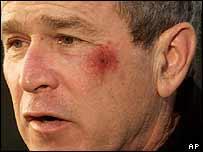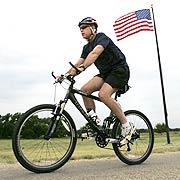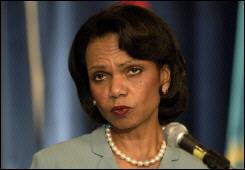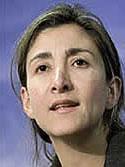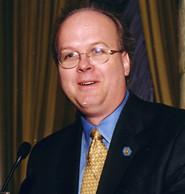
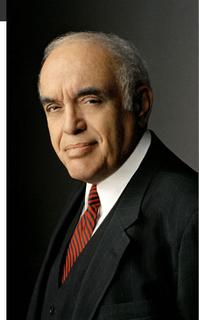
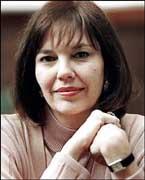
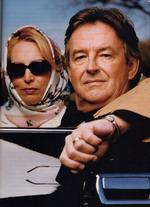 The American Progress published the following rundown of the "Plame Affair" and it's Karl Rove:
The American Progress published the following rundown of the "Plame Affair" and it's Karl Rove:We Do The Research So Reporters Don't Have To
Stunningly, no member of the White House press corps has
asked press secretary Scott McClellan about Karl Rove's role in outing former CIA operative Valerie Plame since
Rove's lawyer admitted on Saturday that Rove was one of Time reporter Matt Cooper's sources. Below are ten vital facts that the media needs to communicate -- and that Americans deserve to know -- about PlameGate. (Click
here to get the email addresses of your local media outlets, and let them know they're missing out on a serious story.)
THE PLAME LEAK IS OF VITAL IMPORTANCE: Commenting on the remarks of the federal judges who have ruled on Cooper/Miller case, Lawrence O'Donnell today pointed out that "All the judges who have seen the prosecutor's secret evidence
firmly believe he is pursuing a very serious crime, and they have done everything they can to help him get an indictment." And remember, it was George W. Bush's father who, speaking at CIA headquarters in 1999, said, "I have nothing but contempt and anger for those who betray the trust by exposing the name of our sources.
They are, in my view, the most insidious, of traitors." Likewise, when asked whether exposing Valerie Plame's identity would be "worse than Watergate," President Bush's close colleague Ed Gillespie said, "Yeah, I suppose in terms of the real world implications of it," adding that "to reveal the identity of an undercover CIA operative --
it's abhorrent, and it should be a crime, and it is a crime." Those who try to play down the importance of PlameGate are deceiving themselves.
KARL ROVE HAS NOT YET ANSWERED WHETHER HE IS A SUBJECT OF THE INVESTIGATION: Rove's attorney Robert Luskin acknowledged over the weekend that Karl Rove has testified "two or three times" before the grand jury. These multiple visits prompted one lawyer "representing a witness sympathetic to the White House" to tell Newsweek that there is "
growing 'concern' in the White House that the prosecutor is interested in Rove." Luskin has insisted in several recent interviews that Rove is not a "target" of Fitzgerald's investigation. But this leaves open the possibility that Rove is a "subject" of the investigation. The difference? While a "target" is a "
putative defendant" according to the
U.S. Attorneys' Manual, a "subject" is a person not yet thought to have committed a crime but "whose conduct is
within the scope of the grand jury's investigation" (these two definitions are distinct from the third possible status, a mere "witness"). Lawrence O'Donnell, who broke the news of Rove's contacts with Time reporter Matt Cooper, notes: "Three trips to the same grand jury is
frequently an indicator of subject status." So, Mr. Rove, if you're not a target, are you a witness or a subject?
ROVE HAS NEVER DENIED LEAKING THE IDENTITY OF WILSON'S WIFE: The public statements by Karl Rove and his attorney Robert Luskin regarding Rove's role have been worded vaguely, in such a way that leaves unclear whether Rove is denying that he ever revealed (in any way) the true identity of Joseph Wilson's wife, or whether he is merely denying that he revealed the specific name -- Valerie Plame (also her maiden name) -- that she used only while carrying out her covert work. Rove's attorney told Newsweek that Rove "
did not tell any reporter that Valerie Plame worked for the CIA"; he told the Los Angeles Times that Rove "
absolutely did not identify Valerie Plame." And in August 2004, Rove denied knowing Plame's name: "Well, I'll repeat what I said to ABC News when this whole thing broke some number of months ago.
I didn't know her name and didn't leak her name." Under a strict interpretation, these statements confirm only that Rove did not leak Plame's name, not whether he revealed her role as a covert operative.
ROVE'S DISCLOSURE OF CLASSIFIED INFORMATION IS UNCLEAR: As several commentators have noted, Rove's attorney has almost uniformly stated that Rove never "knowingly" disclosed classified information (although on one occassion, Luskin did apparently say to
Bloomberg News that Rove "did not reveal any confidential information," leaving off the word "knowingly"). As Lawrence O'Donnell pointed out: "Not coincidentally, the word 'knowing' is the most important word in the controlling statute (U.S. Code: Title 50: Section 421). To violate the law, Rove had to tell Cooper about a covert agent "
knowing that the information disclosed so identifies such covert agent and that the United States is taking affirmative measures to conceal such covert agent's intelligence relationship to the United States." So, did Rove ever unknowingly disclose classified information? Moreover, a legal
memo obtained by Hill reporter Josh Marshall interpreted the relevant laws to hold that "a government insider, with access to classified information, such as Rove is also prohibited from
confirming or further disseminating the identity of a covert agent even after someone else has leaked it." According to today's New York Times, "Cooper's decision to drop his refusal to testify followed discussions on Wednesday morning
among lawyers representing Mr. Cooper and Karl Rove, the senior White House political adviser, according to a person who has been officially briefed on the case." Did Rove ever confirm or disseminate classified information?
ROVE COULD COME CLEAN AT ANY TIME: A simple, clear statement by Rove would do much to end speculation about his role in any potential wrongdoing. Yet Rove is
refusing to answer questions about the case, and, more suspiciously, his attorney is justifying his silence with the specious claim that Special Prosecutor Patrick Fitzgerald has "
asked us not to talk about what Karl has had to say." As O'Donnell points out, "Prosecutors have absolutely no control over what witnesses say when they leave the grand jury room.
Rove can tell us word-for-word what he said to the grand jury and would if he thought it would help him." The only thing that prevents him from doing so, O'Donnell adds, is "a good lawyer who is trying to keep him out of jail."
BUSH ADMINISTRATION OFFICIALS COULD KEEP MILLER OUT OF JAIL: Whether one
supports or
opposes Judith Miller's refusal to reveal her source, the fact remains that she never had to face this fate. At any time, the Bush administration officials who leaked Valerie Plame's identity could step forward and relieve Miller of her difficult circumstances. As Joseph Wilson noted last night, "The sentencing of Judith Miller to jail for refusing to disclose her sources is the direct result of the culture of unaccountability that infects the Bush White House from top to bottom. ... Clearly, the conspiracy to cover up the web of lies that underpinned the invasion of Iraq is
more important to the White House than coming clean on a serious breach of national security." Likewise, John Dean, former White House counsel to President Nixon during the Watergate controversy, said on Tuesday: "Whoever it is, he or she is a huge coward. And the fact that they would let somebody [go to prison] -- this is the sort of thing that Mafia people do, that drug kings do, not somebody who's serving in the White House as a public servant."
ROVE AND NOVAK HAVE A TRACK RECORD: Karl Rove and Robert Novak apparently have a history of spreading damaging information. In January 2003, Ron Suskind reported in Esquire that "Sources close to the former president [George H.W. Bush] say Rove was fired from the 1992 Bush presidential campaign after he planted a negative story with columnist Robert Novak about dissatisfaction with campaign fundraising chief and Bush loyalist Robert Mosbacher Jr. It was smoked out, and he was summarily ousted."
AT LEAST ONE WHITE HOUSE OFFICIAL HAS BEEN CAUGHT IN A LIE: Rove's acknowledgement of his role in spreading information about Wilson and Plame seems to clearly contradict a claim in October 2003 by White House Press Secretary Scott McClellan, who said that "those individuals [Karl Rove, Elliot Abrams, and Lewis Libby]
assured me they were not involved with this." So, did Karl Rove and his White House colleagues deceive Scott McClellan, or did Scott McClellan deceive the American people?
AN APPARENT DISCREPANCY EXISTS IN THE TIMELINE OF ROVE'S CONTACTS WITH JOURNALISTS: Though Rove's involvement in spreading information about former ambassador Wilson and his wife is now known, the timeline remains unclear. Recent statements from Rove's lawyer have only muddied the picture. In October 2003, Rove reportedly admitted to the grand jury "that he circulated and discussed damaging information regarding [Plame] with others in the White House, outside political consultants, and journalists," part of an "aggressive campaign to discredit Wilson through the leaking and disseminating of derogatory information regarding him and his wife." According to investigative journalist Murray Waas, Rove told the grand jury that "
he had only circulated information about Plame after it had appeared in [Robert] Novak's column." But according to Rove's attorney Robert Luskin, "Rove spoke to Cooper
three or four days before Novak's column appeared." What's the real story here?
PRESIDENT BUSH'S THOUGHTS ARE UNKNOWN: For well over a year, the White House line has been that "no one wants to get to the bottom of [this investigation]
more than the President of the United States." Considering his great interest, it seems surprising, then, that President Bush has had nothing to say about Saturday's revelation that his own top advisor, Karl Rove, apparently did indeed participate in the coordinated campaign to smear former ambassador Joe Wilson. This fact alone speaks volumes about the character of this White House.

